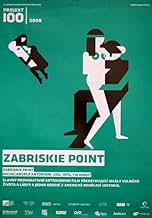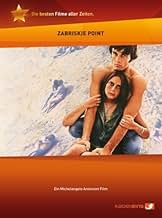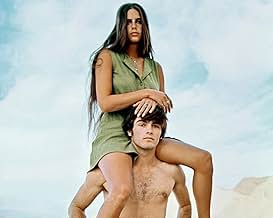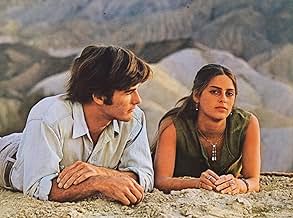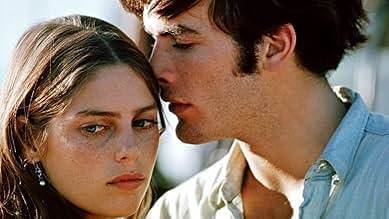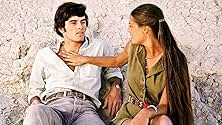CALIFICACIÓN DE IMDb
6.9/10
18 k
TU CALIFICACIÓN
En Zabriskie Point, el punto más al sur de Estados Unidos, dos perfectos desconocidos se encuentran y empieza un romance desenfrenado.En Zabriskie Point, el punto más al sur de Estados Unidos, dos perfectos desconocidos se encuentran y empieza un romance desenfrenado.En Zabriskie Point, el punto más al sur de Estados Unidos, dos perfectos desconocidos se encuentran y empieza un romance desenfrenado.
- Dirección
- Guionistas
- Elenco
- Premios
- 1 premio ganado y 1 nominación en total
Martin Abrahams
- Radical student
- (sin créditos)
Michael L. Davis
- Police lieutenant on loudspeaker
- (sin créditos)
Lee Duncan
- Highway patrolman
- (sin créditos)
George Dunn
- Airport mechanic
- (sin créditos)
Dennis Falt
- University student
- (sin créditos)
Harrison Ford
- Arrested student
- (sin créditos)
Jim Goldrup
- College student
- (sin créditos)
Norman Grabowski
- Man in Deli
- (sin créditos)
Bill Hickman
- Gun store owner
- (sin créditos)
- …
Kenner G. Kemp
- Departing Plane Passenger
- (sin créditos)
Peter Lake
- Documentary cameraman
- (sin créditos)
Opiniones destacadas
At the time of its release, ZABRISKE POINT caused great division in film-going circles. A "wannabe classic but artless piece of empty canvas" was the view of the establishment, most critics included. To the alternative movement...a "revelation of everything that is wrong in the world today (1970)" Not too much has changed judging by the comments here, although an overall user-rating of an almost respectable 6.2 suggests an increase in the appreciation factor.
Poor old Mark Frechette and Daria Halpin as the star crossed lovers - definitely in the wrong place at the wrong time (weren't they EVERY wronged and downtrodden teenager of the period???) copped most of the flack, totally unreasonably. They were SUPPOSED to be Mr and Miss typical troubled youth, not Rhett Butler and Scarlett O'Hara on a bender! This was an image-driven film and many flag waving americans were incensed that Italy's outre director Antonioni was given free rein to portray the angst of American youth.
Cinematically, the film was awesome. In London at the time, I saw it on its release and thought that from an objective viewpoint it was quite brilliant (admittedly, I was only 24 myself). Many have commented on its alleged self-indulgence. Yeah, well it WAS Antonioni's film - surely he was free to express his art-form in whatever way he saw fit at the time? The desert scenes have not been topped by any film since.
ZABRISKIE POINT may be shy of "masterpiece" status (mind you, who amongst is solely qualified to make THAT call?) but it is probably now, THE defining film of 70's culture. A time when acid trips, communal living, even just plain old fashioned "love" were not that easy a choice to live with!
Poor old Mark Frechette and Daria Halpin as the star crossed lovers - definitely in the wrong place at the wrong time (weren't they EVERY wronged and downtrodden teenager of the period???) copped most of the flack, totally unreasonably. They were SUPPOSED to be Mr and Miss typical troubled youth, not Rhett Butler and Scarlett O'Hara on a bender! This was an image-driven film and many flag waving americans were incensed that Italy's outre director Antonioni was given free rein to portray the angst of American youth.
Cinematically, the film was awesome. In London at the time, I saw it on its release and thought that from an objective viewpoint it was quite brilliant (admittedly, I was only 24 myself). Many have commented on its alleged self-indulgence. Yeah, well it WAS Antonioni's film - surely he was free to express his art-form in whatever way he saw fit at the time? The desert scenes have not been topped by any film since.
ZABRISKIE POINT may be shy of "masterpiece" status (mind you, who amongst is solely qualified to make THAT call?) but it is probably now, THE defining film of 70's culture. A time when acid trips, communal living, even just plain old fashioned "love" were not that easy a choice to live with!
Antonioni really showed some 'cojones' when he had this movie made. He went to America working under a contract from the most lavish studio (MGM) and he made the most damning portrait of American society i've ever seen. Having seen LA first hand this is the most accurate portrayal of the crowded, overheated and impersonal city. If only Antonioni had met Bill Hicks...
The subsequent burial by the studio is understandable, after such a whopping investment and dismal return. It is sad that people don't get to see this film any more as i believe Antonioni has been proved right. Here he predicts the end of the hippie/civil rights movement in the politics of America. Everyone is much more interested in what goes into their pockets and the relentless expansion of living space into the inhospitable (yet beautiful) desert and beyond. How i would love to see interest in this film re-kindled and a lavish DVD release.
I beseech people to watch Zabriskie Point with an open mind and an open heart. We have a genuinely unique film commenting on a turning point in the history of the most powerful nation on the planet, and we have forgotten about it.
An unexpected gem.
The subsequent burial by the studio is understandable, after such a whopping investment and dismal return. It is sad that people don't get to see this film any more as i believe Antonioni has been proved right. Here he predicts the end of the hippie/civil rights movement in the politics of America. Everyone is much more interested in what goes into their pockets and the relentless expansion of living space into the inhospitable (yet beautiful) desert and beyond. How i would love to see interest in this film re-kindled and a lavish DVD release.
I beseech people to watch Zabriskie Point with an open mind and an open heart. We have a genuinely unique film commenting on a turning point in the history of the most powerful nation on the planet, and we have forgotten about it.
An unexpected gem.
This is the film in Antonioni's middle period that most critics dismiss quickly, as a 'flawed' look at 60s American youth culture/politics. For what it's worth, I found it more touching and memorable than his more acclaimed films like L'AVVENTURA, perhaps because he shows more emotion & empathy here than anywhere else. The story is simple, but it is used as a frame for Antonioni's brilliant observations of, and critique on American consumerist culture, student life, the counter-culture, and the whole anti-establishment, anti-war backlash that was so prominent then.
Even from a purely technical point of view, it is a remarkably crafted film; from the opening credits sequence to the bizarre desert 'love-in', to the use of billboards, and right down to that jaw-dropping, cathartic finale that used 17 camera set-ups (in it's own way, as powerful as the climax of The Wild Bunch). Also, Antonioni chose one hell of a leading lady with Daria Halperin, one of the most beautiful ever to grace the screen. There isn't much 'acting' involved, as this feels more like a docu-drama, and so the use of non- professionals as the lead couple works quite effectively within that context. And the soundtrack is not only filled with marvelous music, its use is impressive as well (I can't forget the start of the film, mostly due to the selection of music - by Pink Floyd - that grooms the visuals so well).
Contrary to popular opinion, this is quite an achievement in cinema, and one I would enthusiastically recommend to anyone with a taste or tolerance for the off- beat. Well worth seeking out, and one of those key films of the 60s that demands a DVD restoration/release.
Even from a purely technical point of view, it is a remarkably crafted film; from the opening credits sequence to the bizarre desert 'love-in', to the use of billboards, and right down to that jaw-dropping, cathartic finale that used 17 camera set-ups (in it's own way, as powerful as the climax of The Wild Bunch). Also, Antonioni chose one hell of a leading lady with Daria Halperin, one of the most beautiful ever to grace the screen. There isn't much 'acting' involved, as this feels more like a docu-drama, and so the use of non- professionals as the lead couple works quite effectively within that context. And the soundtrack is not only filled with marvelous music, its use is impressive as well (I can't forget the start of the film, mostly due to the selection of music - by Pink Floyd - that grooms the visuals so well).
Contrary to popular opinion, this is quite an achievement in cinema, and one I would enthusiastically recommend to anyone with a taste or tolerance for the off- beat. Well worth seeking out, and one of those key films of the 60s that demands a DVD restoration/release.
I was told it was one of those "either you love it or you hate it" movies. Well, I loved it. Obvious hippie-era, dated and easy symbolism and all. So, I probably have no taste at all when it comes to Antonioni, but this and La Notte (made exactly a decade earlier) are my favourites among his movies so far. Made two years before I was born, Zabriskie Point was supposed to have been Michelangelo's great American epic. But apparently, it turned out to be a flop. I really can't see why. Before watching it I'd read that it was rather boring, so I braced myself for a very slow movie - though I love me a slow movie. For my taste, Zabriskie didn't have a tedious minute in it. While watching it, I made a mental note of how European it was on the director's part to make such frequent use of advertisement billboards in almost every urban scene, enormous billboards dwarfing any human form in sight. This recurrent visual element is obviously there to underline the way that consumerism crushes the individual in American society. But then I watched L'Eclisse straight afterwards, which is set in Rome in the early 60s, and noticed that Antonioni often included billboards in it as well. After all, the masterful use of landscapes, architecture and inanimate objects in each frame with or without human beings is an Antonioni trademark this is precisely the way that he evokes his characters' psychological states, with more or less understated power and great visual impact. He is virtually unsurpassed in this skill.
Zabriskie Point starred two very appealing leads that should have become big stars of the 70s, but never did. Mark Frechette, whom I'd already seen in Francesco Rosi's fine WWI-set movie Uomini Contro, had a very tragic life and died aged just 27. According to his biography page, he donated his $60,000 earnings from Zabriskie to a commune. Mark's co-star Daria Halprin, apparently also Dennis Hopper's wife later on, has the stunning, natural beauty and appeal of a young Ornella Muti one of those luminous beauties that don't need a shred of make-up to turn heads. Like Frechette, she has only graced a couple of obscure movies and has never become a star, but at least she didn't die tragically. Most notably, Zabriskie Point contains one of the most original sex scenes ever filmed - one that brings home a sense of youthful playfulness like few I've seen - as well as a powerfully cathartic ending. It may be the most banal sequence ever filmed as far as its symbolism goes, but I can't see how anyone can deny its beauty and wonderful sense of emotional release. Never has an explosion looked so good, and so poetic. It seems to be an explosion that restores order rather than bringing chaos.
Zabriskie Point starred two very appealing leads that should have become big stars of the 70s, but never did. Mark Frechette, whom I'd already seen in Francesco Rosi's fine WWI-set movie Uomini Contro, had a very tragic life and died aged just 27. According to his biography page, he donated his $60,000 earnings from Zabriskie to a commune. Mark's co-star Daria Halprin, apparently also Dennis Hopper's wife later on, has the stunning, natural beauty and appeal of a young Ornella Muti one of those luminous beauties that don't need a shred of make-up to turn heads. Like Frechette, she has only graced a couple of obscure movies and has never become a star, but at least she didn't die tragically. Most notably, Zabriskie Point contains one of the most original sex scenes ever filmed - one that brings home a sense of youthful playfulness like few I've seen - as well as a powerfully cathartic ending. It may be the most banal sequence ever filmed as far as its symbolism goes, but I can't see how anyone can deny its beauty and wonderful sense of emotional release. Never has an explosion looked so good, and so poetic. It seems to be an explosion that restores order rather than bringing chaos.
Antonioni, by making this film, had assumed the role of Papa Smurf to all the little long-haired, American, radical student-Smurfs. He had taken them under the guiding protection of his European communist wings, showing appreciation and support for their confused American ways. (These Smurfs are red and wear blue, not the other way around.) The radical Smurfs were happy to get the guidance of a wise old man with gray hair who regularly preys to the God of all long-haired Smurfs, Lenin the Communist - another wise old man whose beard made the Smurfs take him even more seriously, for it symbolized something wise, though they did not quite know why they regarded the beard to have this kind of deep effect on them. Castro, another wise bearded man, has often profited from this confusion and exuded magical powers with his beard over his naive overseas admirers. (Not to mention Che Guevara: that beard has a certain je-ne-sais-pas-quoi about it, makes one want to immediately embrace Marx and his lovely, pacifistic teachings
) The film starts with a muddled meeting of radically stupid radical students, who engage in dialogues that truly redefine the word "confused". As confused as a blind-folded dog falling of a high-story building into a bottomless pit. Suddenly, the movie's "hero" (well, Antonioni's hero) rises up and says something to his pathetic left-wing peers and then leaves, hoping that this display of "mega-coolness" will improve his James Dean image and vastly increase his chances of getting laid with the best "chicks" in the next mass hippie orgy. Eventually he gets into trouble with cops (i.e. pigs) at a rally, and spends the movie under the blue American capitalist skies, looking for freedom
Or something like that.
Antonioni's predictable assault on capitalism is not only intellectually hollow, but has (or had) nothing new to offer; it's just the same old trigger-happy one-dimensional cops, businessmen discussing business deals (and what's wrong with that, isn't that how Antonioni's movies get made?), and endless shots of TV commercials and billboards advertising the oh-so morally decadent products for the abhorrent, selfish, and greedy right-wing rabble-population who thinks of no one but themselves, their families, their work, and their children.
Papa Smurf Antonioni, just like his long-haired Smurfs and Smurfettes of the late 60s, failed to notice the most obvious and vital aspect about their silly movement: they were allowed to have their laughable meetings and express their anti-establishment opinions freely within that very establishment, whereas the students in those countries whose left-wing systems they admired, did not (and still do not). By far the greatest irony about the hippies - and Antonioni, naturally, failed to realize this as well (his judgment being clouded by cocaine-snorting and an excessive intake of LSD) - is that hippies were (are) the garbage-residue of capitalism. This is an incredible irony. Only in a successfully-functioning capitalist system can you find that species called "hippie"; a spoiled, ungrateful, and selfish bunch of middle and upper-middle class losers.
The film itself seems to go on forever. Antonioni takes his sweet time with getting on with it, while including overlong scenes of pointlessness, with a high dullness factor. His attempts at symbolism are annoying and trite. His statements are highly dubious, at best. This film is Antonioni's way of saying that violent revolution is the solution. And this is what we get from an old, saturated, filthy-rich, fat film-maker who lives in villas and dines in the best French and Italian restaurants.
I don't remember seeing any major Western movie about the Tiananmen massacre of thousands of students in China. But when one Western student gets shot for waving Che Guevara's face into all our faces, we get ten major films about it at once. I suppose this means that a Chinese life is worth a thousand times less than a Western one at least to the left-wing hypocrites who infest movies.
If you're a Marxist neo-hippy and disliked this awful review, please klick "NO" below.
Antonioni's predictable assault on capitalism is not only intellectually hollow, but has (or had) nothing new to offer; it's just the same old trigger-happy one-dimensional cops, businessmen discussing business deals (and what's wrong with that, isn't that how Antonioni's movies get made?), and endless shots of TV commercials and billboards advertising the oh-so morally decadent products for the abhorrent, selfish, and greedy right-wing rabble-population who thinks of no one but themselves, their families, their work, and their children.
Papa Smurf Antonioni, just like his long-haired Smurfs and Smurfettes of the late 60s, failed to notice the most obvious and vital aspect about their silly movement: they were allowed to have their laughable meetings and express their anti-establishment opinions freely within that very establishment, whereas the students in those countries whose left-wing systems they admired, did not (and still do not). By far the greatest irony about the hippies - and Antonioni, naturally, failed to realize this as well (his judgment being clouded by cocaine-snorting and an excessive intake of LSD) - is that hippies were (are) the garbage-residue of capitalism. This is an incredible irony. Only in a successfully-functioning capitalist system can you find that species called "hippie"; a spoiled, ungrateful, and selfish bunch of middle and upper-middle class losers.
The film itself seems to go on forever. Antonioni takes his sweet time with getting on with it, while including overlong scenes of pointlessness, with a high dullness factor. His attempts at symbolism are annoying and trite. His statements are highly dubious, at best. This film is Antonioni's way of saying that violent revolution is the solution. And this is what we get from an old, saturated, filthy-rich, fat film-maker who lives in villas and dines in the best French and Italian restaurants.
I don't remember seeing any major Western movie about the Tiananmen massacre of thousands of students in China. But when one Western student gets shot for waving Che Guevara's face into all our faces, we get ten major films about it at once. I suppose this means that a Chinese life is worth a thousand times less than a Western one at least to the left-wing hypocrites who infest movies.
If you're a Marxist neo-hippy and disliked this awful review, please klick "NO" below.
¿Sabías que…?
- TriviaAntonioni met with Jim Morrison during early production to ask for a musical contribution to the soundtrack. Morrison and the Doors provided "L'America" which Antonioni then rejected.
- ErroresZabriskie Point, in Death Valley National Park (California, USA) is not actually the lowest-elevation point in the United States. That would be Badwater Basin, at a depth of 282 feet below sea level, which is also located in Death Valley National Park about 20 miles away.
- Citas
[booking a protester]
Cop: Occupation?
William S. Polit, protester: Associate professor of history.
Cop: That's too long, Bill. I'll just put down clerk.
- Versiones alternativasIn the original version, the song that's playing when Daria drives away at the very end and over the closing "End" title card is a Roy Orbison song, but in the 1984 MGM/UA Home Video version it's a continuation of the Pink Floyd song. The 1991 MGM/UA Home Video version restores the Orbison song.
- ConexionesEdited into Histoire(s) du cinéma: La monnaie de l'absolu (1999)
Selecciones populares
Inicia sesión para calificar y agrega a la lista de videos para obtener recomendaciones personalizadas
- How long is Zabriskie Point?Con tecnología de Alexa
Detalles
Taquilla
- Presupuesto
- USD 7,000,000 (estimado)
- Total a nivel mundial
- USD 84,879
- Tiempo de ejecución1 hora 53 minutos
- Mezcla de sonido
- Relación de aspecto
- 2.35 : 1
Contribuir a esta página
Sugiere una edición o agrega el contenido que falta

Principales brechas de datos
What is the Japanese language plot outline for Zabriskie Point (1970)?
Responda

